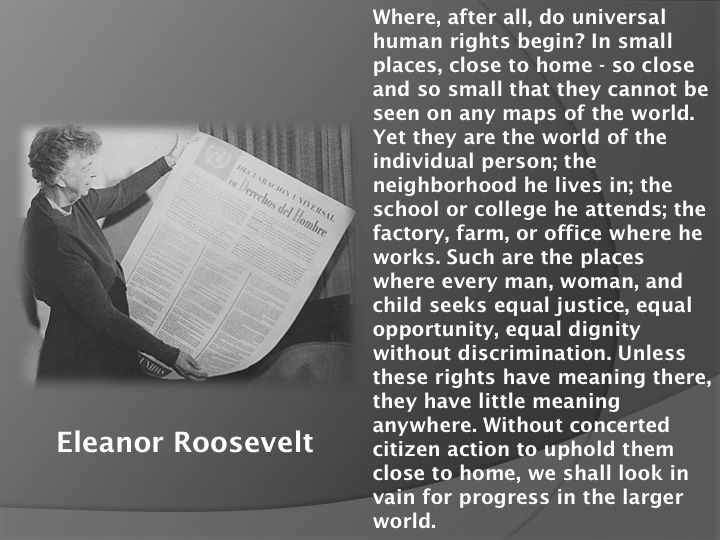Thank you to everyone who attended our training session last night. We thought you may be interested in further reading about the history of Human Rights. Below are some links to Scottish Human Rights and Advocacy Organisations as well as background information about Eleanor Roosevelt, who was the driving force behind the 1948 Charter of Liberties….. a true Champion of Human Rights.
ELEANOR ROOSEVELT (1884–1962)
(Material courtesy of www.humanrights.com)
As the chair of the United Nations Human Rights Commission, Eleanor Roosevelt was the driving force in creating the 1948 charter of liberties which will always be her legacy: The Universal Declaration of Human Rights.
Born in New York City, Eleanor married rising politician Franklin Delano Roosevelt in 1905 and became fully immersed in public service. By the time they arrived in the White House in 1933 as President and First Lady, she was already deeply involved in human rights and social justice issues. Continuing her work on behalf of all people, she advocated equal rights for women, African-Americans and Depression-era workers, bringing inspiration and attention to their causes. Courageously outspoken, she publicly supported Marian Anderson when in 1939 the black singer was denied the use of Washington’s Constitution Hall because of her race. Roosevelt saw to it that Anderson performed instead on the steps of the Lincoln Memorial, creating an enduring and inspiring image of personal courage and human rights.
In 1946, Roosevelt was appointed as a delegate to the United Nations by President Harry Truman, who had succeeded to the White House after the death of Franklin Roosevelt in 1945. As head of the Human Rights Commission, she was instrumental in formulating the Universal Declaration of Human Rights, which she submitted to the United Nations General Assembly with these words:
“We stand today at the threshold of a great event both in the life of the United Nations and in the life of mankind. This declaration may well become the international Magna Carta for all men everywhere.”
Called “First Lady of the World” by President Truman for her lifelong humanitarian achievements, Roosevelt worked to the end of her life to gain acceptance and implementation of the rights set forth in the Declaration. The legacy of her words and her work appears in the constitutions of scores of nations and in an evolving body of international law that now protects the rights of men and women across the world.
“Do what you feel in your heart to be right—for you’ll be criticized anyway. You’ll be damned if you do, and damned if you don’t.” —Eleanor Roosevelt
Further Reading:
Scottish Independent Advocacy Alliance www.siaa.org.uk
Scottish Human Rights Commission www.scottishhumanrights.com
International Federation for Human Rights www.fidh.org
Human Rights Act 1998 http://www.legislation.gov.uk/ukpga/1998/42/contents
Equality and Human Rights Commission https://www.equalityhumanrights.com/en/human-rights/human-rights-act

